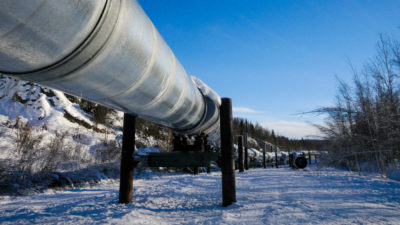Canadian Natural Resources Ltd. (TSX:CNQ)(NYSE:CNQ) is one of Canada’s largest and arguably most stable energy names, but people often forget that unlike its large-cap, integrated peers, Canadian Natural suffers a key disadvantage—namely, it sells a large portion of its production at discounted Western Canadian Select (WCS) prices.
This is because 35% of Canadian Natural’s production is heavy crude or bitumen which is sold based off WCS prices. Due to the fact that this crude is thicker, it is more complex and expensive to refine, and therefore trades at a discount to Western Texas Intermediate (WTI) prices, which has fallen over 40%.
Currently, WCS trades at about US$40, compared with almost US$52 for WTI, and since many of the assets that produce this crude are high-operating cost oil sands projects with fairly high to breakeven prices, it is reasonable to ask the question, is Canadian Natural prepared should oil prices fall further?
Here’s why the answer appears to be yes.
Canadian Natural is diversified across commodities
Every investor knows that diversification is a key risk management principle, and Canadian Natural implements this principle perhaps better than any large-cap producer to reduce risk and allow for flexibility to allocate capital to the highest return segments based on market conditions.
Currently, about 35% of Canadian Natural’s production comes from natural gas, which has seen more modest declines than oil, and has more favourable fundamentals going forward. In addition to this, about 30% of production comes from light crude and synthetic crude oil, which provides Canadian Natural exposure to the premium priced WTI.
This segment should grow going forward, since one of Canadian Natural’s primary growth projects is its Horizon oil sands mine. Although Horizon mines bitumen, it has an on-site upgrading facility that allows the company to upgrade its bitumen into synthetic crude oil, which trades at a premium to WTI. Horizon produced 128,000 bbl/d in Q4 2014, with a final production goal of 250,000 bbl/d.
Canadian Natural is also diversified across production types
Although 35% of production does come from discounted heavy crude, Canadian Natural is well diversified in this area with regards to production methods, with some methods having more favourable cost profiles.
For example, about 15% of Canadian Natural’s total production is heavy crude produced via thermal in situ oil sands technology. These are fairly expensive projects since the deposits are too deep to mine, yet too viscous to flow, so costly steam injection technologies need to be employed. As a result, operating costs for Canadian Natural’s Primrose in situ project are around US$38/bbl.
In contrast, however, another 20% of Canadian Natural’s production is heavy crude produced via conventional methods. These methods of production target reserves where oil flows more readily and can be lifted using conventional well technology, or with the slight help of more advanced technology. As a result, these production methods are much less costly.
Canadian Natural’s Pelican Lake project, for example, has low operating costs of only $9/bbl. Although Canadian Natural’s heavy oil segment yields lower prices, a diversity in operating costs—with some being significantly lower than current WCS prices—ensures that Canadian Natural can withstand lower prices since low-cost projects can offset high-cost projects to a degree.
Canadian Natural has a strong balance sheet
Should prices drop much further, Canadian Natural has a strong balance sheet and credit profile to fall back on. The company currently has $4.1 billion of available bank credit facilities. With capital expenditures of $6 billion expected for 2015, along with an expected $6.1-6.5 billion of operating cash flow (at an estimated WTI price of US$55/bbl), the company is well prepared to withstand further pricing pressure.







